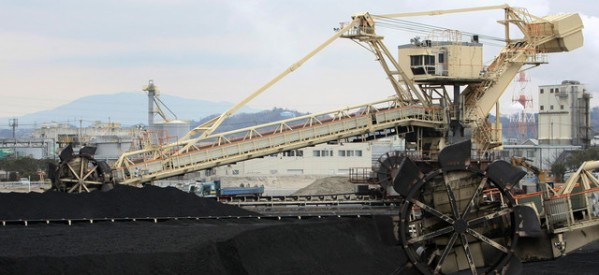Japan goes for coal as the Yen drives up cost of energy

Japan is boosting its use of cheaper coal at the expense of oil and LNG to counter a jump in energy import costs that are rising because of a weak yen and with little prospect of a near-term return of nuclear power after the Fukushima crisis in 2011.
“Coal remains the cheapest fuel to burn in Japan given the high prices of oil and LNG,” said Amrita Sen, chief oil analyst at London-based consultancy Energy Aspects.
Strong Japanese demand during seasonal peaks of summer and winter have helped oil and LNG prices to spike in the past two years, but the world’s fifth-largest energy consumer may catch a break this year due to ample coal supply – which may mean leading suppliers Australia and Indonesia cannot necessarily expect a price boost from the extra demand.
Though demand from Japan, the fourth-largest user of coal, may help to support Asian coal markets, coal stocks are still high and higher imports may not come straight away, said Sen.
Japan’s top six utilities expect to raise coal consumption by 24 percent in the fiscal year starting April 1 from calendar year 2012, with two new coal-fired power units expected to reduce the need for imports of expensive liquefied natural gas (LNG) and oil.
Warmer weather may also result in a bump in coal and fuel demand, with Japan’s meteorological agency expecting higher temperatures than average from April to June, and mostly normal to hotter-than-average temperatures this summer. Electricity use usually increases during warm weather to power air conditioners.
CARBON RISK
Greater use of dirty coal, however, risks raising carbon emissions from the fifth-biggest greenhouse gas emitter as it puts a hold on environmental goals to revive its economy.
“Japan is already very aware of environmental concerns and is investing in renewables, both solar and wind, although the effects don’t come through till 2015,” Sen said.
Coal will make up just over a fifth of the top six utilities’ fossil fuel mix in 2013-2014, up from a 16.3 percent share in 2012, Reuters calculations based on trade ministry and industry data showed. Data for fiscal 2012-2013 is not yet available.
LNG’s share of the mix will fall from 62.7 percent to just below 60 percent. Crude and fuel oil will slip from 21 percent to 19.4 percent.
Even with falling imports from the more expensive fossil fuels, energy costs won’t necessarily fall if the yen continues to weaken, and that should keep interest in coal strong.
In January, Japan’s volume of crude oil imports fell 4.7 percent from a year earlier but the value rose 5.9 percent, and that was while average benchmark Brent crude prices in the month were only 0.8 percent higher than a year earlier.
The drive to use more coal comes as Japan did not renew its commitment to emissions cuts for the Kyoto protocol’s second round that started this year, instead saying it would decide on a new reduction target for 2020 by November.
The bulk of the coal demand increase will come from two coal-fired power units built by Tokyo Electric Power Co that have a combined capacity of 1,600 megawatts in northern Japan, where the nuclear crisis took place two years ago. The two new units are scheduled to start trial operations in April in Fukushima and Ibaraki prefectures.
Japan’s second-biggest thermal coal user after J-Power , Chubu Electric Power Co, will keep its demand steady in 2013-2014.
NUCLEAR RESTARTS THIS YEAR
Total fossil fuel consumption is forecast to drop 2.9 percent in the next fiscal year from 2012 as the six utilities expect 11 nuclear reactors to restart.
That could be an overly optimistic view, according to analysts. Japan’s two operating reactors – out of a total of 50 – are due for maintenance in September and tough new safety checks still may make it difficult to bring units online.
Of five analysts polled, three expect a couple of the idled nuclear reactors to restart by end of this year in line with the government’s push, despite public opposition.
HSBC economist Izumi Devalier said as many as 10 reactors could be restarted by the end of 2014, which would save around 500 billion yen ($5.31 billion) in fuel costs![]() and reduce pressure on the current account.
and reduce pressure on the current account.
“Public opinion is divided on the nuclear revival,” Devalier said in a March 6 note. “But with a weak yen pushing up the import bill, energy-starved Japan might not have a choice.”






